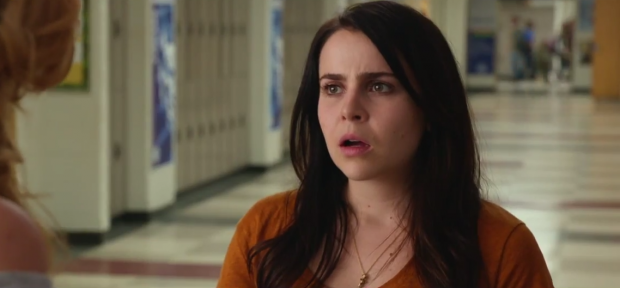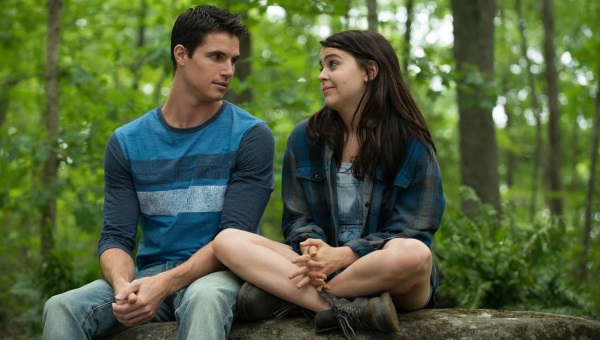The DUFF, an earnest high-school comedy that mostly feels like the dried-out, overheated leftovers of John Hughes, wants to deal in “the truth,” using a ridiculous Urban Dictionary neologism to signify the corrupt heart of high-school social systems. This, of course, is not news; it wasn’t in Hughes’ day, or twenty-some years prior to it, for that matter. The DUFF, benefiting from the accumulated weight of nearly four decades of similar films, the gestalt of social media, and heightened awareness of bullying and body issues, still can’t cull any new insight or fresh humor. The only epiphany you’re likely to walk away with is that Mae Whitman is an incredibly charming actress, and deserving of a film that can showcase her clear-eyed charisma. Sadly, this movie isn’t quite that vehicle.
Whitman stars as Bianca, a genuinely self-possessed teenager whose grasp of her worth starts eroding when she’s ousted as the “DUFF” (designated ugly fat friend) amongst her two beautifully coiffed best friends. She’s fed this information by jock neighbor Wesley (Robbie Arnell), and given her response, you’d think she’d just learned that we’re all in the Matrix, and reality is a futuristic wasteland. Genuinely hurt by what she assumes is calculation on the part of her BFFs (Skyler Samuels and Bianca A. Santos) to make her the “gatekeeper’”for any would-be suitors coming their way, Bianca retreats from her comfortable persona—a sassy horror geek clad in loose-fitting overalls and flannel—and seeks to change perceptions. This initially involves making a deal with lunk-headed Wesley, exchanging study notes for lessons on infiltrating the clique of the popular, all of it heading to a most obvious romantic conclusion.

Perhaps the script by Josh A. Kagan, based on Kody Kepplinger’s novel, is purposely attempting to subvert the structure of Pygmalion, or maybe it’s just digested so much of that story’s DNA from previous high-school “ugly duckling” movies, that it can’t help itself. To be fair to the script, it does make a play for genuinely exploring the need for real self-acceptance and healthy mind/body awareness, but gets hopelessly mired in the same status quo that Bianca herself is straining against. When her efforts to be popular go amiss, allowing resident mean girl Madison to humiliate her with a YouTube video of impromptu mannequin humping (don’t ask), Bianca is forced to either wither or push forward as her own person. In the early going, The DUFF seems to be genuinely on to something, helped out immensely by Whitman, who takes the undefined character of Bianca and makes her a relatable cipher that we cheer and root for.
Whitman, who got her start early on playing the Prez’s daughter in Independence Day, has done some great if undistinguished work over the past few years, takes The DUFF by the horns, ably arguing for her right to leading lady status. At twenty-six, she’d only seem like a real teenager at the high-school from 10 Things I Hate About You, and even with the over-alls and surrounded by the glamorous Stepford teens, Whitman can’t pull off the “fat” or “ugly” part of her DUFF crucible. Of course, part of the point is that at some level, everyone is somebody’s DUFF, regardless of their looks or poise.

However, when Whitman’s easy-going charm and eccentric spirit are immediately the beguiling access point for the audience, it only highlights how ill-fitting the idea of the DUFF as an all-consuming social stigma is. Bianca is a clearly scripted creation ready to run the wheel of the plot like a self-actualizing hamster, but Whitman is smarter than that, and her performance critiques the very movie she’s in. She’s willing to take chances, to be human and accentuate her own foibles; why can’t the film do the same? When the treatise on loving yourself unconditionally turns over and becomes the same ‘get the boy’ story we’re used to, The DUFF loses most of its already waning credibility.
The DUFF has some energy and spirit sprinkled throughout, including some winning chemistry between Whitman and Arnell, a slightly muted turn by Ken Jeong as a sympathetic teacher, and Alison Janney as Bianca’s mother, who’s turned self-help warrior-goddess extolling the virtues of power suits. What works, though, we’ve seen before, and fairly recently in Emma Stone’s Easy A, from which Ari Sendel’s film cribs more than a few scenes. In its best moments, the movie argues for awareness of ourselves and awareness of how we are to others, finally condemning the concept of the DUFF, at the same time it rides the term to potential box-office success. Too bad, it never figures out its own identity, playing dumpy gatekeeper to the likes of Some Kind of Wonderful and She’s All That.
The DUFF is now playing in wide release.

